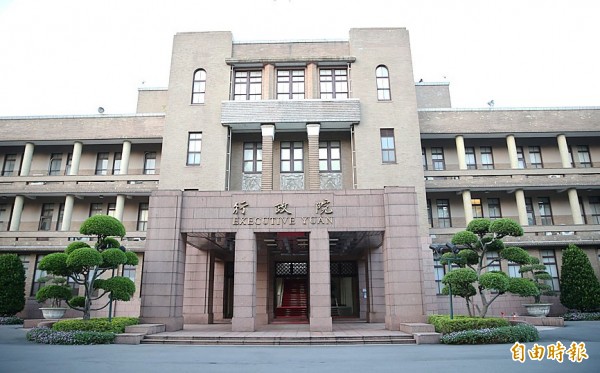《TAIPEI TIMES》 Public offices to ban China IT ware

The Executive Yuan building in Taipei is pictured on Dec. 1 last year. Photo: Liao Chen-huei, Taipei Times
SECURITY: Guidelines banning the use of Chinese products will affect government offices and employees, not private citizens or firms, a Cabinet spokeswoman said
By Chen Yu-fu, Chou Hsiang-yun and Jonathan Chin / Staff reporters, with staff writer
The Cabinet is this week to publish guidelines governing a ban on the use of Chinese information technology (IT) products by central and local government offices, an Executive Yuan official who declined to be named said yesterday.
Entitled “Guidelines for Utilization of Mainland Area-Made Information Technology Products by Public Agencies” (各公務機關使用陸資產品處理原則), the executive order would apply broadly to any foreign-made product deemed to pose a security risk, the official said.
The guidelines cover mobile devices, security cameras and server components among others, and Chinese companies affected by the ban could include Huawei Technologies Co, Hangzhou Hikvision Digital Technology Co and ZTE Corp, the official said.
The Executive Yuan believes it has the legal authority to impose the guidelines on local government offices, the official added.
Executive Yuan spokeswoman Kolas Yotaka said that the guidelines are nearly complete and they are to affect government offices and public employees, not private citizens or enterprises.
The Executive Yuan is nearly finished with drafting the order and Premier Su Tseng-chang (蘇貞昌) is expected to approve the guidelines in the coming days, when it becomes a publicly available document, she said.
In related news, industry sources said that many of the public and private buses use Huawei products to provide passengers with free Wi-Fi services.
Zhinan Bus Co, which operates in Taipei and New Taipei City, said that about 400 of its buses use Huawei products to provide riders with free Wi-Fi.
In New Taipei City, Zhinan buses have been using routers made by MikroTik in Latvia that are coupled with Huawei-made 4G network cards to provide Wi-Fi services.
Huawei network cards are costly, but offer superior stability and connection speed, while the Chinese company’s business agents had also been more helpful during installation, Zhinan said, adding that it has not received any customer complaints regarding information security.
Capital Bus Co general manager Lee Chien-wen (李建文) said his company tried to stick with Taiwanese cards, but had to purchase 20 Huawei-made cards after some of the Taiwanese products repeatedly broke down.
“We are a private business and we receive no public subsidies for purchases,” he said.
“The paperwork for those purchases are in order and our business follows the law scrupulously,” he said.
However, the use of Huawei components anywhere in the circuit of a hotspot device, Wi-Fi router or network base station could open data to backdoor exploits, former National Applied Science Laboratories vice president Lin Ying-dar (林盈達) said.
“Since most free Wi-Fi networks are not protected by passwords or encryption, the browsing data are vulnerable to sniffing or interception by hackers,” said Lin, who teaches computer science at National Chiao Tung University.
“In many airports around the world, public Wi-Fi is known to be intercepted by hackers, as well as government agencies,” he said. “My advice is to use it as little as possible, or surf through an encrypted VPN [virtual private network].”
新聞來源:TAIPEI TIMES
%http://www.taipeitimes.com/

















